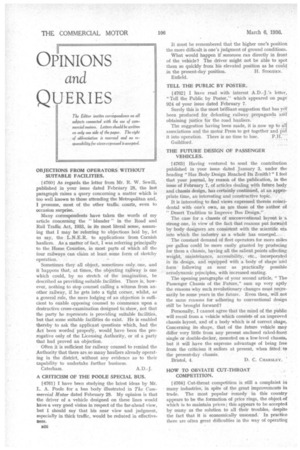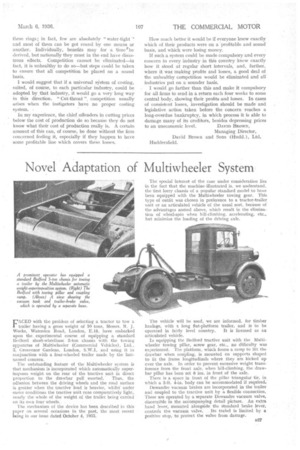OPINIONS
Page 36

Page 37

If you've noticed an error in this article please click here to report it so we can fix it.
and
QUERIES
OBJECTIONS FROM OPERATORS WITHOUT SUITABLE FACILITIES.
[47601 As regards the letter from Mr. R. W. Sewill, published in your issue dated February 28, the last paragraph raises a query concerning a matter which is too well known to those attending the Metropolitan and, I presume, most of the other traffic courts, even to occasion surprise.
Many correspondents have taken the words of my article concerning the " blunder" in the Road and Rail Traffic Act, 1933, in its most literal sense, assuming that I may be referring to objections laid by, let us say, the L.N.E.R. to applications from Cornish hauliers. As a matter of fact, I was referring principally to the Home Counties, in most parts of which all the four railways can claim at least some form of sketchy operation. .
Sometimes they all object, sometimes only one, and it happens that, at times, the objecting railway is one which could, by no stretch of the imagination, be described as providing suitable facilities. There is, however, nothing to stop counsel calling a witness from another railway, if he gets into a tight corner, whilst, as a general rule, the mere lodging of an objection is sufficient to enable opposing counsel to commence upon a destructive cross-examination designed to. show, not that the party he represents is providing suitable facilities, but that some suitable facilities do exist. He is enabled thereby to ask the applicant questions which, had the Act been worded properlY, would have been the prerogative only of the Licensing Authority, or of a party that had proved an objection.
Often it is sufficient for railway counsel to remind the Authority that there are,so many hauliers already operating in the district, without any evidence as to their capability to undertake further business.
Caterham. A.D.-J.
A CRITICISM OF THE POOLE SPECIAL BUS.
[4761] I have been studying the latest ideas by Mr. L. A. Poole for a bus body illustrated in The Commercial .11fotor dated February 28. My opinion is that the driver of a 'vehicle designed on these lines would have a very good vision in respect of the far-ahead view, but I should say that his near view and judgment, especially in. thick traffic, would be reduced in effective
It must be remembered that the higher one's position the more difficult is one's judgment of ground conditions.
What would happen if' someone, ran directly in front of the vehicle? The driver might not be able to spot them so quickly from his elevated position as he could
in the present-day position. H. STOGDEN. Enfield.
TELL THE PUBLIC BY POSTER.
[4762] I have read with interest A.D.-J.'s letter, " Tell the Public by Poster," which appeared on page 924 of your issue dated February 7.
Surely this is the most brilliant suggestion that has yet been produced for defeating. railway propaganda arid obtaining justice for the road hauliers.
The suggestion having been made, it is now up to all associations and the motor Press to get together and
it into operation. There is no time to lose. 13.1i' Guildford.
THE FUTURE DESIGN OF PASSENGER VEHICLES.
[47631 Having ventured to send the contribution published in your issue dated January 3, under the heading "Has Body Design Reached Its Zenith?" I feel that your journal, by reason of the publication, in the issue of February 7, of articles dealing with future body and chassis design, has certainly continued, at an appropriate time, an interesting and constructive topic.
It is interesting to find views expressed therein coincidental with one's own, as are those of the author of " Desert Tradition to Improve Bus Design."
The case for a chassis of unconventional layout is 'a strong one, in view of the fact that reasons put forward by body designers are consistent with the scientific era into which the industry as a whole has emerged._ .
The constant demand of fleet operators for more miles per gallon could be more easily granted by producing for them a chassis, having all the salient points affecting weight, maintenance, accessibility, etc., incorporated in its design, and equipped with a body of shape and form following as near as practically possible aerodynamic principles, with increased seating.
The opening paragraphs of your second article, "The Passenger Chassis of the Future," sum up very aptly the reasons why such revolutionary changes must necessarily be some years in the future. Even then, will not the same reasons for adhering to conventional design still be brought forward?
Personally, I cannot agree that the mind of the public will recoil from a vehicle which consists of an improved chassis layout, and of a body which is of correct shape. Concerning its shape, that of the future vehicle may differ very little from any present enclosed raked-front single or double-decker, mounted on a low-level el:lassie, but it will have the supreme advantage of being free from the criticism it suffers at present, when fittecr.te the present-day chassis.
Bristol, 4. D. C. CHARSLEY.
HOW TO OBVIATE CUT-THROAT COMPETITION.
[4764] Cut-throat competition is still a complaint in many industries, in spite of the great improvements in trade. The most popular remedy in this country appears to be the formation of price rings, the object of which is to maintain prices ; this appears to be accepted by many as the solution to all their troubles, despite the fact that it is economically unsound. In practice there are often great difficulties in the way of operating
these rings; in fact, few are absolutely " water-tight and most of them can be got round by one means or another. Individually, benefits may for a time t be derived, but nationally they must in the end have disastrous effects. Competition cannot be eliminated—in fact, it is unhealthy to do so—but steps could be taken to ensure that all competition be placed on a sound basis.
I would suggest that if a universal system of costing, suited, of course, to each particular industry, could be adopted by that industry, it would go a very long way in this direction. " Cut-throat ", competition usually arises when the instigators have no proper costing system. •
In my experience, the chief offenders in cutting prices below the cOst of production do so because they do not know what their cost of production really is. A. certain amount of this can, of course, be done without the firm concerned feeling it, especially if they happen to have some profitable line which covers these losses. How much better it would be if everyone knew exactly which of their products were on a profitable and sound basis, and which were losing money.
If such a system could be made compulsory ancl every concern in every industry in this country knew exactly how it stood at regular short intervals, and, further, where it was making profits and losses, a good deal of the unhealthy competition would be eliminated arid all industries put on a sounder basis.
I would go farther than this and make it compulsory for all firms to send in a return each four weeks to some central body, showing their profits and losses. In cases of 'consistent losses, investigation should be made and legislative action taken before the concern reaches a long-overdue bankruptcy, in which process it is able to damage many of its creditors, besides depressing prices
to an uneconomic level. DAVID BROWN, Managing Director, David Brown and Sons (Hudd.), Ltd. Huddersfield.




















































































